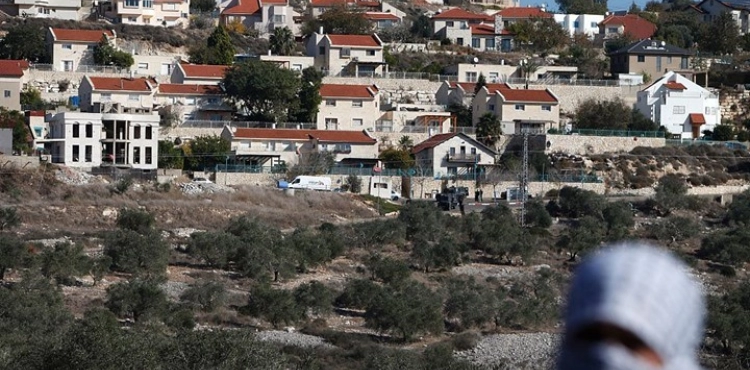The Guardian published an article for the journalist at the Middle East Center at the London School of Economics (LSE), Ian Black, in which he said that Benjamin Netanyahu has now made matters very clear regarding the annexation file.
Black said that on 28 May the Israeli Prime Minister said that when his government - and not if it would - proceed with unilateral annexation of parts of the occupied West Bank, thousands of Palestinians will not be granted citizenship nor equal rights.
Shortly before that, a group of "Israeli" settlers published a picture of them looking at a map of what they call, as Netanyahu does, Judea and Samaria, prompting comments from Palestinians - and liberal Israelis - that the image expresses the institutionalization of a formal apartheid regime (apartheid system). It is difficult to disagree with this conclusion.
Netanyahu made this statement after three inconclusive elections and was finally able to form a coalition government with his former rival Benny Gantz, head of the centrist political coalition Blue and White. Under their agreement, starting July 1, and in coordination with America, steps will be taken to formally annex illegal settlements in the Jordan Valley.
It is not certain yet what will happen. Donald Trump´s re-election is an important variable if we consider the volatile American domestic situation, in addition to the Jordanian and Egyptian reactions - the only two Arab countries that have agreements with Israel.
The article said that the devil is not in the details here. If any annexation takes place, it will be a flagrant violation of international law and a large number of United Nations resolutions.
It cannot pass without an answer. Israel must face sanctions as Russia did when it took Crimea from Ukraine.
Activists say the annexation will mean that they no longer focus unsuccessfully on an inexpensive occupation, but on a rights-based approach, Israel will enter the apartheid period in South Africa, and if the numbers of the parties in this case are roughly equal - not 11 percent is a white minority that rules South Africa From Pretoria until 1994. That will be the end of impunity.
The article argues that from now it will certainly be difficult to claim that a two-state solution is still possible. There have been no peace negotiations since 2014.
In 2008, Ehud Olmert and Mahmoud Abbas came close to a deal, but they failed to do so.
Before that, the hopes of the first intifada in 1987 evaporated, when it became clear that the Oslo agreement would not lead to a Palestinian state. The second intifada also killed those hopes. But is there an alternative?
The truth is that no one has a strategy that comes close to being a process for achieving one state with the same rights for all. On the Israeli side, there is a small movement "two states in one homeland" that is the closest anyone has ever reached to a confederation relationship: it could allow, in theory at least, the Palestinians By exercising the right of return, Jews may live in areas of their concern on religious or national grounds. But this solution is hard to imagine.
The article pointed out that the annexation process will make matters worse: the short-term risks include the possibility of the collapse of the Palestinian Authority and the end of what remains of Oslo, a crisis in Israel´s relationship with Jordan and Egypt and the de facto allies in the Gulf, and most important of all, the return of the resistance that might make the last intifada appear pandemic. And it would destabilize an already volatile region, providing opportunities for exploitation from Iran and Hezbollah.
And the Palestinians will suffer directly. Lawyer Michael Sfard warned that the annexation "will lead to major seizures of Palestinian land and property, some of them automatically, and the consequent expulsion of people, families and entire communities from the annexed lands", and the situation in the Gaza Strip where two million Palestinians live under the siege will not change.
He added: "In the big picture, the annexation will represent a historic turning point for Palestine. Future historians will compare it to the Balfour Declaration in 1917 and the wars of 1948 and 1967, and it will upset the main principle recognized by the Peel Commission in 1937 and the nascent United Nations in 1947, which is that the only way to solve the problem is the division of the Holy Land. To two Jewish and Arab states, and to guarantee the right of national self-determination to both peoples who they consider to be theirs. "
Amidst global confusion, signs of a common international response are not encouraging. Trump´s "deal of the century" was rejected by the Palestinians, with all their affiliation.
The article said the Democratic presidential candidate, Joe Biden, was not radical enough to repair the damage Trump had caused. The European Union is divided, Britain is preoccupied with post-Brexit unresolved issues, and it does not seem to be acting in any meaningful way.
Moreover, the unilateral annexation will lead the Israelis and Palestinians and their unequal struggle to unknown areas.
But history teaches us one lesson: the facts on the ground, whether legal or otherwise, are not expected to be reversed without resistance.
Even if the annexation is late or does not happen, the situation will not have improved and there is no happy ending in the near future.












